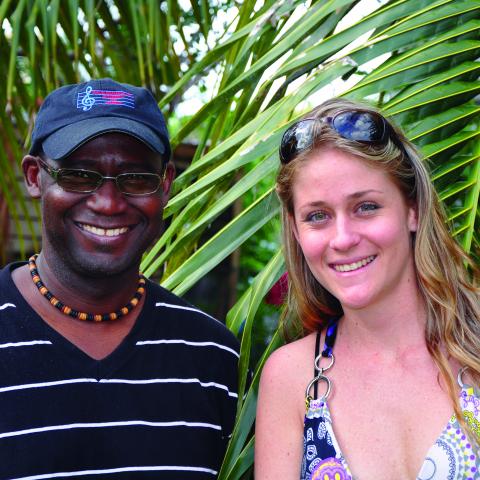More Than Music Lessons

From the left: Paul Emanuel ’99 and Moana Avventi. Both are residents of St. Martin and Avventi is a professional music major at Berklee.
I’m often asked what it was like to grow up on a Caribbean island. But I never really know how to respond other than to say that to me, a kid from St. Martin, Boston seemed pretty exotic. Having the Grand-Case beach as a backyard, however, was definitely one of the greatest parts of my childhood. I remember going to visit my extended family in Switzerland during the summers and feeling claustrophobic at the sight of tall mountains surrounding me. I was accustomed to always seeing the horizon.
My parents left Switzerland when they were in their thirties. They sold their businesses, bought the smallest sailing boat they could find and crossed the Atlantic, casting off from Portugal. After a few months by themselves on the ocean, they landed on the Caribbean island of Guadeloupe. They spent a little time sailing from island to island until they reached the French side of St Martin. They thought it looked like a great place to raise a child. That’s how I came to grow up dancing to the rhythm of soca music in the street during carnivals, swimming in the sea after school, and eating Johnny cakes on Sundays.
My parent’s little boat was my home for the first five years of my life. On the way to school in a tiny dinghy, my mom would always make me sing in harmony with her to keep me awake. I guess water splashing my face somehow wasn’t adequate. She says I was singing very loudly before I could even speak. That was apparently a great attraction for the tourists in St. Martin. My dad is a musician, so music was always present in our home. Most nights, other musicians when they were not playing at restaurants would stop by to jam with my dad on our boat. I knew the songs by heart despite the fact that I didn’t understand the English lyrics.
When a Berklee alumnus opened a private music studio on the island, my father asked me if I wanted to learn an instrument. Of course I said yes and started taking piano lessons with a man named Paul Emmanuel ’99. My connection with Paul was pivotal. He offered his students more than music education, there were also important life lessons he taught directly and by example.
A Self Starter
Paul had grown up in St. Martin in a very musical family and taught himself as many instruments he could get his hands on. He spoke English at home, but had to speak French in school. That was hard for him. He recalls bringing his guitar to school and asking if he could just play a song for a grade. Madam Louisy, a sympathetic French teacher, wanted to help and assigned him to write a paper about the history of the instruments he played. Paul did a lot better with that assignment than others, and Madam encouraged him to pursue music. At that point, Paul didn’t even know you could study music.
He started playing bass by ear, and as he was looking for an instructor, a group of Berklee alumni from St. Martin returned home to the island and organized a concert. Among them were bassist Winston Maccow ’82, as well as Anastacia Larmonie ’90, and Carlyle Baritteau. Paul was totally blown away by the concert and set his sights on attending Berklee. He was accepted in 1987.
After working construction for a year, Paul had saved enough money and to come to Berkle for his first semester in 1988. Afterward, he returned to St. Martin to save for his next semester and continued studying the harmony and arranging books he’d brought back with him. It took two years before he had enough money to return for his second semester. It was a constant struggle to save money for future semesters, and it took five years before Paul banked enough to return for his third semester. With help from the organization Journey for Education, some local grants, and a Berklee scholarship, Paul was able to graduate in 1999. It had taken him 11 years to earn his diploma in professional music and speaks volumes about his determination and follow through.
In the spaces between semesters, Paul would give back to the community by teaching lessons to children on the island. He had no facilities, so he simply sat outside on a stool under a tree and taught. After completing his Berklee studies, he saved some money to open a teaching studio equipped with only two chairs, a bass, and a guitar. But he constantly reinvested to improve the studio. He even did all of the construction work himself.
Perseverance Pays
Today, the studio has all sorts of instruments and Paul teaches acoustic and electric bass, guitar, piano, flute, alto sax, violin, and drums. At one point he had over 90 students. He taught each day from 7:00 a.m. to 8:00 p.m. everyday and played gigs at night. That schedule put him in the emergency room a few times, so he cut his load to 70 students and has a waiting list.
Paul is very generous and regularly lends amps and instruments to students in need, he sometimes just gives instruments to those who can’t afford them. “All I ask is that they give the instrument to another student, if they decide they don’t want to play anymore,” he says.
The fruits of his labor are showing in the lives of his students. Some have applied to Berklee, another plans to attend a French conservatory. One student with potential named Ali, had a transformative experience with Paul. When Paul heard Ali was not treating his mother properly, he told him he couldn’t come back for lessons as long as he was acting badly. For months, Ali tried to convince Paul to take him back anyway. Only after he decided to change his life did Paul start to teach him again. Ali went off to college in France, and would call Paul frequently. But when he returned to St. Martin, he picked up some bad habits. Ali started hanging out on the streets all day and felt just playing weekend gigs was an easy way to get by in life. Paul offered him free lessons to get him off the street and help him get serious about music and working. After Ali got a job, Paul offered to pay for his tuition for Berklee’s Five-week program. “But he has to work hard to pay for housing and living expenses there,” Paul says. He is hoping Ali will become motivated enough to become a teacher one day.
When I began studing with Paul, he saw my passion and he told my parents to send me to Berklee’s summer program. My dad had always wanted to attend Berklee, but never got to. Pooling their resources with financial assistance from relatives, my parents managed to send me.
I’ve followed Paul’s footsteps and am enrolled at Berklee as a Professional Music major with a focus on private teaching. I too struggle to earn enough money by holding down two jobs on campus and working in St. Martin between semesters. With scholarships and lots of help from my family, I’ve gotten to my final semester. I am unsure how the finances will work out, but when I think of Paul taking 11 years to graduate, I feel very lucky that I’ve gotten this far. I’ll find a way, even if I have to come back in a few years. I also want to follow Paul’s example of helping kids with music, and more. One day it will be my turn to guide young students and perhaps point them toward Berklee.




